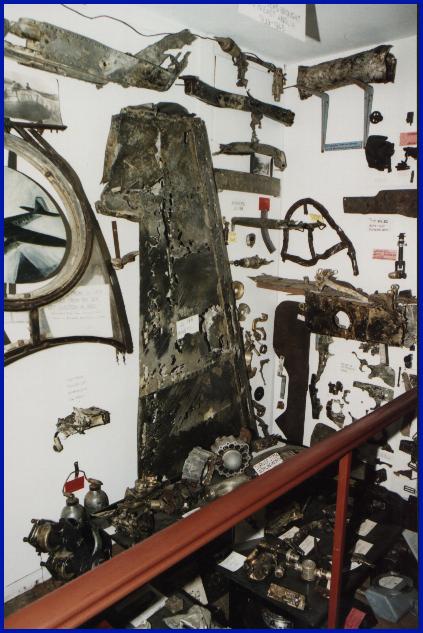
ArchaeologyAviation archaeology or "wreckology" as it is often called, is the study and field investigation of aircraft crash-sites. It has without doubt made a major contribution to the story of the museum. During World War 2, some 2,500 aircraft crashed or made forced-landings in Norfolk and Suffolk. Despite the efforts of British and American recovery teams, much wreckage remains, either buried beneath the ground, submerged in the North Sea off the East Anglian coast, or removed at the time as "souvenirs".
Over the years, museum members have examined and researched many dozens of aircraft crash-sites in an attempt to exploit this unique source of aviation relics for display at Flixton. Some of the crash-sites have yielded only a few small fragments. A few have evolved into excavations of major proportion, digging down to a depth of 6m or more to recover engines and other major sections of airframe which have lain undisturbed beneath the countryside for more than 50 years. Some have defied all efforts to locate them - the dwindling number of living eyewitnesses makes the pinpointing of such sites difficult - and this type of research is most definitely ongoing. Because of the nature of the acquisition of relics, i.e. recovery from beneath the ground or after salt-water immersion, many items are in poor condition and in urgent need of preservation/restoration work. Museum staff using techniques developed over the years have carried out all of this work. Even with extensive restoration, some of the items on display at the museum are not readily recognisable as they are in the form of wreckage debris. Interpretation captions and illustrations are therefore very important in this type of exhibition. Having an extensive archive of material on the crash incidents has a considerable bearing on the way the artefacts are captioned. Wreckology has added many unusual and unique items to the Flixton museum displays. Images from our Aviation Archaeology in the museum PLEASE NOTEThe remains of all aircraft which have crashed in military service (whether on land or at sea) are protected by the Protection of Military Remains Act 1986. It is an offence under that Act to tamper with, damage, move or unearth the remains unless the Secretary of State has issued a Licence authorising those things to be done and they are done in accordance with the conditions of the licence. |
|||||||||||
|
